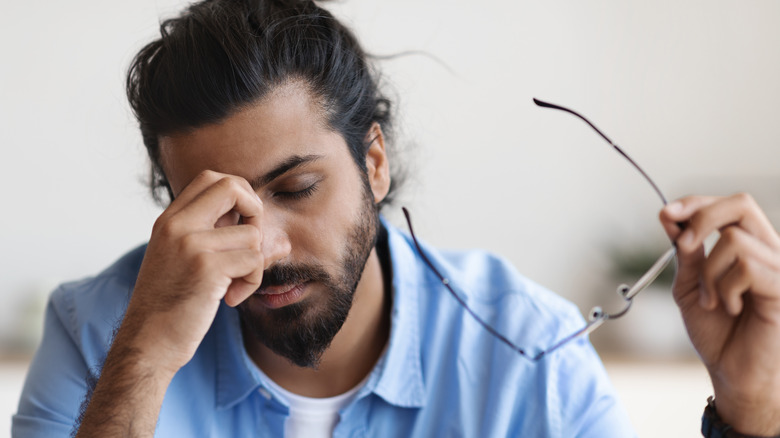What It Really Means When Your Eye Keeps Twitching
Contrary to what it sounds like, an eye twitch is really more of an eyelid twitch rather than a function of the eyeball itself, according to experts at LasikPlus. Also referred to as myokymia, this involuntary muscle movement may occur for some people only on occasion, while others may experience involuntary blinking throughout the day (via Cedars Sinai). In severe cases, eye twitching due to a medical condition may be ongoing. Most cases of eye twitching are temporary and are not considered cause for concern.
Often observed more commonly in middle-aged or older women, eye twitching can be attributed to a number of different factors depending on severity (per Cedars Sinai). A minor eye twitch, for example, may be prompted by stress, lack of sleep, or alcohol consumption, notes LasikPlus. Caffeine consumption, allergies, or eye strain from screen usage may also trigger eye twitching.
Experts at Cedars Sinai explain that our upper and lower eyelids are each controlled by a different facial muscle. Therefore, an eye that keeps twitching may be a sign these muscles are not functioning properly.
Health conditions that may cause eye twitching
While the exact cause is unknown, a condition known as benign essential blepharospasm is thought to affect the functioning of the facial muscles surrounding the eyes (via Cedars Sinai). Characterized by frequent, ongoing eye twitching, the condition affects both eyes simultaneously. Experts at LasikPlus point out that benign essential blepharospasm may also be linked with conditions such as dry eyes or Tourette's syndrome and is not considered life-threatening.
Although rare, severe cases of eye twitching may stem from a neurological condition (per LasikPlus). Hemifacial spasms, for instance — caused by the inflammation of facial nerves — can cause extreme eye and facial twitching. Other such conditions include Parkinson's disease, bell palsy, multiple sclerosis, or brain damage related to stroke or inflammation (via Cedars Sinai).
If you experience eye twitching that does not improve within a few days or worsens, be sure to consult with your eye doctor, advises LasikPlus. Otherwise, experts at Cedars Sinai state that reducing caffeine intake, getting adequate amounts of sleep, minimizing stress, and wearing protective eyewear such as sunglasses can all help protect against eye twitching.


